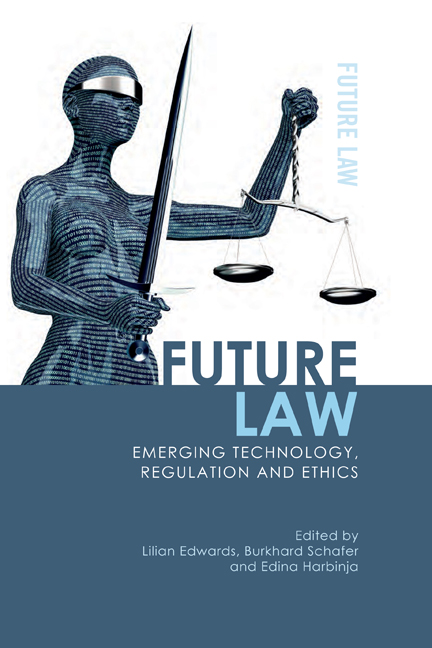Book contents
- Frontmatter
- Contents
- List of Contributors
- List of Figures and Tables
- Table of Cases
- Table of Legislation
- 1 The Future’s Already Here: It’s Just Unevenly Edited
- Part I From Privacy and Princesses, to Security and Star Wars
- 2 Privacy and Identity through the Eyes of Disney Princesses
- 3 White Noise from the White Goods? Privacy by Design for Ambient Domestic Computing
- 4 Citizen-consumers in a Personalised Galaxy: Emotion-influenced Decision Making, a True Path to the Dark Side?
- 5 Big Data Ethics: Darth Vader and the Green Cross Man
- 6 Security Vulnerabilities, Backdoors, Exploits and the Marketplace for Each: The Return of Boba Fett – Bug Bounty Hunter in the New Republic
- Part II A Matter of (Future) Life and Death
- 7 Will My Genes Really Help Me Fit Into Those Jeans? Personal Genomics and Wrap Contracts
- 8 On Living and Undead Wills: ZombAIs, Technology and the Future of Inheritance Law
- 9 ‘Be Right Back’: What Rights Do We Have over Post-mortem Avatars of Ourselves?
- Part III Regulating Autonomous Technologies: Software Are Doing it for Themselves
- 10 Autonomous Intelligent Agents and the Roman Law of Slavery
- 11 Autonomous Vehicles: An Analysis of the Regulatory and Legal Landscape
- Part IV Textual Poaching: Copyright in a Remixed World
- 12 Living in a Remixed World: Comparative Analysis of Transformative Uses in Copyright Law
- 13 Repost This: Instagram and the Art of Re-photography
- Index
4 - Citizen-consumers in a Personalised Galaxy: Emotion-influenced Decision Making, a True Path to the Dark Side?
Published online by Cambridge University Press: 17 September 2020
- Frontmatter
- Contents
- List of Contributors
- List of Figures and Tables
- Table of Cases
- Table of Legislation
- 1 The Future’s Already Here: It’s Just Unevenly Edited
- Part I From Privacy and Princesses, to Security and Star Wars
- 2 Privacy and Identity through the Eyes of Disney Princesses
- 3 White Noise from the White Goods? Privacy by Design for Ambient Domestic Computing
- 4 Citizen-consumers in a Personalised Galaxy: Emotion-influenced Decision Making, a True Path to the Dark Side?
- 5 Big Data Ethics: Darth Vader and the Green Cross Man
- 6 Security Vulnerabilities, Backdoors, Exploits and the Marketplace for Each: The Return of Boba Fett – Bug Bounty Hunter in the New Republic
- Part II A Matter of (Future) Life and Death
- 7 Will My Genes Really Help Me Fit Into Those Jeans? Personal Genomics and Wrap Contracts
- 8 On Living and Undead Wills: ZombAIs, Technology and the Future of Inheritance Law
- 9 ‘Be Right Back’: What Rights Do We Have over Post-mortem Avatars of Ourselves?
- Part III Regulating Autonomous Technologies: Software Are Doing it for Themselves
- 10 Autonomous Intelligent Agents and the Roman Law of Slavery
- 11 Autonomous Vehicles: An Analysis of the Regulatory and Legal Landscape
- Part IV Textual Poaching: Copyright in a Remixed World
- 12 Living in a Remixed World: Comparative Analysis of Transformative Uses in Copyright Law
- 13 Repost This: Instagram and the Art of Re-photography
- Index
Summary
Fear is the path to the Dark Side. Fear leads to anger, anger leads to hate, hate leads to suffering.
Yoda, Star Wars: Episode I – The Phantom MenaceIntroduction
A good Jedi must resist the influence of emotions that subvert reason. Jedi Master Yoda's warning of the consequences of fear and the graduated descent to the dark side, referred to above, does not however categorise all emo-tions as dangerous. Instead and as noted by Stephens, the Jedi philosophy appears to be somewhat stoic in character. Stoicism, as first advanced by Hellenic philosophers, advocates the passivity towards disturbing emotions (or apatheia), while at the same time recognising ‘ “good emotional states” that are not pathological movements of the soul, namely, benevolence (wishing someone good things for his own sake), joy (in virtuous deeds), and caution (reasonable wariness)’. The stoics suggest that one must separate what can be controlled and what remains outside of one's reach. This appears to be reflected in the fictional Jedi teachings and is manifested when Luke Skywalker urges his father to ‘let go’ of his hate and the dark side.
But how separable are emotions practically, and should we really delineate emotion (or indeed particular emotions) from reason in order to make effective decisions? Is there not something to be said for letting our emotions guide our responses? And is this not the de facto reality? It is clear that emotions play a key role in decision making and this is aptly reflected in their role in advertising and marketing. These questions are becoming increasingly relevant, given the rise in emotion detection and monetisation online. In this vein, one can further wonder how a wide-scale adoption of such technologies would be affected by (and indeed affect) the law. In aiming to reflect upon these points this chapter examines the emergence of such technologies in an online context. Although, as discussed elsewhere, there is a clear debate to be had regarding the emergence of empathic media and their use vis-à-vis fake news, its use in public spaces for commercial purposes, its deployment for public security and safety purposes and also issues relating to the accuracy of the certain emotion detection techniques, such matters remain outside the scope of this targeted chapter.
- Type
- Chapter
- Information
- Future LawEmerging Technology, Regulation and Ethics, pp. 79 - 130Publisher: Edinburgh University PressPrint publication year: 2020

